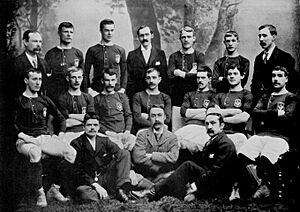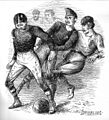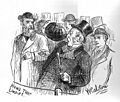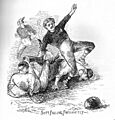History of the Scotland national football team facts for kids
The Scotland national football team has a long and exciting history, starting way back in 1872 with the very first international football match ever played! For many years, Scotland mostly played against other teams from the Home Nations (England, Wales, and Ireland) in a competition called the British Home Championship. The matches against England were always the most exciting and competitive.
The Scottish Football Association (SFA), which runs the team, joined FIFA (the world football governing body) in 1910. However, they later left FIFA in 1928, along with the other Home Nations. This meant Scotland couldn't play in the early World Cups in 1930, 1934, or 1938. After the Second World War, the Home Nations rejoined FIFA, and Scotland began to play in bigger international tournaments. Since then, Scotland has played in eight World Cups and three European Championships, but they've never made it past the first round.
Contents
Early Football Days (1872–1939)
Scotland and England have the oldest national football teams in the world! They first played each other in official international matches starting on 30 November 1872, at Hamilton Crescent in Partick, Scotland. That first game ended in a 0–0 draw. All the Scottish players in that match came from the amateur club Queen's Park in Glasgow.
For the next 40 years, Scotland only played against the other three Home nations (England, Wales, and Ireland). The British Home Championship started in 1883, making these games even more competitive. The matches against England were always very intense, and a strong rivalry quickly grew. Scotland's first game against Wales was on 25 March 1876, which Scotland won comfortably 4–0.
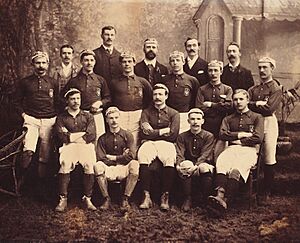
In these early years, Scotland rarely lost. They only lost two of their first 43 international matches! It wasn't until 1903 that Scotland lost to a team other than England, with a 2–0 home defeat by Ireland. Scotland won 26 of the 51 British Home Championships before the Second World War, sharing the title in nine of those years.
One of Scotland's most famous wins was a 5–1 victory against England at Wembley in 1928. This team became known as the "Wembley Wizards". However, this amazing team never played together again.
The SFA joined FIFA in 1910, but they had disagreements with FIFA. All the Home Nations left FIFA in 1928 because of a disagreement about payments to amateur players. This meant Scotland couldn't play in the first World Cups. Scotland played their first match outside the British Isles in 1929, beating Norway 7–3 in Bergen. They also played friendly matches against teams from mainland Europe, winning against Germany, the Netherlands, and France.
The 1950s: First World Cups
Scotland had to wait until 1954 to play in their first World Cup. They had actually qualified for the 1950 FIFA World Cup, but the SFA decided they would only send a team if they won the 1950 British Home Championship. They lost 1–0 to England in their last game, finishing second, so the SFA chose not to send the team.
The SFA was more flexible for the next World Cup, and Scotland qualified. Andy Beattie became the team's first ever manager, but he resigned during the World Cup because the SFA only took 13 players, even though FIFA allowed 22. Scotland lost 1–0 to Austria and 7–0 to Uruguay in the finals. The 7–0 defeat by Uruguay is still Scotland's heaviest defeat.
Scotland also qualified for the 1958 World Cup. They earned their first World Cup point with a 1–1 draw against Yugoslavia, but they lost their other two matches and finished last in their group.
The 1960s: Wembley Glory
Scotland won the British Home Championship in 1962 and 1963. In 1967, Bobby Brown became the Scotland manager. His first game was a huge challenge: against the 1966 World Cup winners England at Wembley. Even though England hadn't lost in 19 international games, Scotland won a famous 3–2 victory! Goals were scored by Denis Law, Bobby Lennox, and Jim McCalliog. Fans were so proud, they called Scotland the "unofficial world champions". Towards the end of the match, Scotland winger Jim Baxter famously played keepie uppie, showing off his skills and teasing the English players.
Despite this amazing win, Scotland just missed out on qualifying for the 1968 European Championship. The team also failed to qualify for the 1970 FIFA World Cup.
The 1970s: World Cup Appearances
Tommy Docherty became manager in 1971 and had some quick success, including sharing a British Home Championship title. He later left to manage Manchester United.
1974 World Cup
Willie Ormond became Scotland manager in 1973. Even though his first match was a big 5–0 loss to England, the team qualified for the 1974 FIFA World Cup, their first in 16 years! Scotland won 3 of their 4 games in a group with Czechoslovakia and Denmark. At the finals in West Germany, Scotland remained unbeaten! They beat Zaire 2–0 and drew 0–0 with Brazil and 1–1 with Yugoslavia. However, they didn't make it past the group stage because of goal difference. Willie Ormond resigned in 1977.
1978 World Cup
Ally MacLeod was appointed Scotland manager in May 1977. Hopes soared when, within a month, the team won the 1977 British Home Championship by beating England 2–1 at Wembley. After the game, the Tartan Army (Scotland fans) celebrated enthusiastically on the pitch. Scotland then secured qualification for the 1978 FIFA World Cup with wins over Czechoslovakia and a key victory over Wales at Anfield.
Before the tournament, MacLeod was very confident, telling everyone Scotland would do great. When the team left for Argentina, thousands of fans cheered them on. However, things started to go wrong. Scotland lost their first World Cup game 3–1 to Peru, even after taking an early lead.
In their second match against Iran, Scotland again took the lead but conceded an equaliser, making their World Cup hopes very slim. To qualify, Scotland needed to beat one of the tournament favorites, the Netherlands, by three goals. Scotland fought back to lead 3–1, with goals from Kenny Dalglish and two from Archie Gemmill. Gemmill's second goal is often called the best goal in Scotland's history, as he dribbled past three Dutch defenders before scoring! But the joy was short-lived, as the Netherlands scored again, and the match finished 3–2. Scotland was knocked out on goal difference for the second World Cup in a row. MacLeod resigned after the finals.
The 1980s: More World Cups
Jock Stein became Scotland manager in 1978. After missing out on Euro 1980, Scotland qualified for their third World Cup in a row in 1982. At the finals, Scotland was eliminated on goal difference again. They won 5–2 against New Zealand, but then lost 4–1 to Brazil and drew 2–2 with the Soviet Union.
Scotland failed to qualify for the 1984 European Championships. However, they qualified for their fourth World Cup in a row in 1986 in a very dramatic way. In their last qualification match against Wales, Scotland needed a draw to get a play-off match. With Wales leading 1–0, Scotland got a penalty kick with just nine minutes left, which Davie Cooper scored. The game ended 1–1, but sadly, manager Jock Stein suffered a heart attack and passed away.
Stein's assistant, Alex Ferguson, took over as manager temporarily. Scotland won their play-off against Australia 2–0 on aggregate. At the World Cup, Scotland got only one point from their three matches, losing to Denmark and West Germany. Their final match against Uruguay was a 0–0 draw, even though Uruguay had a player sent off early. Ferguson left the Scotland job after the World Cup.
Andy Roxburgh took charge after the 1986 World Cup. Scotland failed to qualify for Euro 1988. However, they regrouped and narrowly qualified for the 1990 FIFA World Cup. They beat France 2–0 at Hampden Park and secured qualification with a 1–1 draw against Norway in their final game.
The 1990s: Euros and World Cups
1990 World Cup
Scotland went into the 1990 FIFA World Cup feeling confident after beating the World Cup holders Argentina 1–0 in a friendly. But in their first World Cup match, they surprisingly lost 1–0 to newcomers Costa Rica. They recovered to win the next match against Sweden 2–1. This meant Scotland realistically needed a point from their final game against Brazil to qualify. Scotland held Brazil to 0–0 for 80 minutes, but then conceded a goal. Scotland was again eliminated at the group stage.
Euro 92
Scotland made their first appearance in a European Championship Finals at UEFA Euro 1992. They were knocked out in the first round after losing to Holland and Germany, but they had a good 3–0 win over the former Soviet Union. The Scotland fans won an award from UEFA for their excellent behavior during the tournament, which helped change their reputation.
1994 World Cup Qualifying
Scotland faced a tough group for the 1994 FIFA World Cup qualifiers, including Italy, Portugal, and Switzerland. They lost their opening match in Switzerland 3–1. Scotland played their home games away from Hampden Park due to stadium renovations. They managed 0–0 draws against Italy and Portugal at Ibrox. However, a terrible 5–0 defeat by Portugal in Lisbon in April 1993 ended their chances of qualifying. Manager Andy Roxburgh said, "a team died out there," meaning they had lost all hope. This was a big moment because it meant Scotland would miss the World Cup for the first time since 1970.
Craig Brown Era
After Andy Roxburgh resigned, Craig Brown took over. Scotland was determined to qualify for UEFA Euro 1996 because it was being held in England. The team only lost once in the qualifying section. A key match was a 1–0 home victory over Greece in August 1995, with Ally McCoist scoring the only goal.
Scotland's first match of the tournament was a 0–0 draw against Holland. The next match was against England at Wembley, their first meeting since 1989. England took the lead, and Scotland was awarded a penalty, but David Seaman saved Gary McAllister's shot. Paul Gascoigne then scored a fantastic goal for England. Scotland still had a chance to qualify for the quarter-finals. While they were beating Switzerland 1–0, England was beating Holland 4–0, which would have put Scotland through on goal difference. But then Holland scored a late goal, which, though a small consolation for them, knocked Scotland out based on goals scored.
Scotland moved on to the 1998 FIFA World Cup qualifiers, getting good results by beating Sweden and Austria at home. During this time, Scotland was involved in a strange incident called the "game that never was" against Estonia. Estonia didn't show up for the kick-off on time because of poor floodlights. John Collins kicked off the match for Scotland against an empty field, and the referee blew his whistle after a few seconds. Scotland expected to win by default, but the game was controversially replayed in Monaco, where Scotland drew 0–0. Despite this, Scotland eventually qualified in October 1997 with a 2–0 home victory against Latvia.
Scotland was drawn against defending champions Brazil in the opening game of the World Cup. John Collins scored a penalty to make it 1–1, but an own goal led to a 2–1 defeat. Scotland then drew 1–1 against Norway. This left Scotland with a chance to qualify in their final match against Morocco, but they lost 3–0 and were again eliminated in the first stage.
Scotland had a tough time qualifying for UEFA Euro 2000. They finished second in their group and went into a play-off against England. England won the first leg 2–0 at Hampden. In the second leg at Wembley, Scotland won 1–0 with a goal from Don Hutchison. It was a great victory, but it wasn't enough, and Scotland failed to qualify.
The 2000s: New Managers and Challenges
Scotland missed out on qualifying for the 2002 FIFA World Cup. They struggled to win against their main rivals, Croatia and Belgium. Craig Brown resigned after eight years as manager.
Berti Vogts
The SFA hired their first ever foreign manager, Berti Vogts, from Germany, in February 2002. Vogts wanted to bring in many young players. In his first match, Scotland lost 5–0 to France. They also lost several friendly matches, including 4–1 to South Korea.
Vogts' team started the UEFA Euro 2004 qualifying section badly, going 2–0 down to the Faroe Islands in just 12 minutes. Goals from Paul Lambert and Barry Ferguson salvaged a 2–2 draw, but the team was widely criticized. Despite this difficult start, Scotland finished second in their group to Germany, earning a play-off spot for Euro 2004. They beat the Faroes, Iceland (twice), and drew with Germany at home. They beat Lithuania 1–0 in the final group match to qualify for a play-off against Holland. Scotland beat the Dutch 1–0 at Hampden Park with a goal from James McFadden, raising hopes. But these hopes were crushed days later when Holland won the return match 6–0, giving them a 6–1 win on aggregate.
Vogts faced more criticism after a 4–0 friendly defeat by Wales. He resigned in October 2004, blaming the media. Vogts did introduce many young players to the team, like Craig Gordon, Darren Fletcher, and James McFadden. However, he was often criticized for his team selection and tactics.
Walter Smith
Walter Smith was appointed as the new manager in December 2004. Smith's first game was a 2–0 loss to Italy. However, Scotland achieved good results later, including a 1–1 draw at home to Italy and a 2–1 win in Norway. They also won the Kirin Cup in Japan in May 2006, beating Bulgaria 5–1 and drawing 0–0 with Japan.
The results under Smith gave the country hope. Scotland was placed in a very tough group for UEFA Euro 2008 qualifying, with France, Italy, and Ukraine. Scotland started well with a 6–0 win against the Faroe Islands and a 2–1 win in Lithuania. They then recorded a famous 1–0 victory against France at Hampden on 7 October 2006, with Gary Caldwell scoring the only goal. The next match was a 2–0 defeat in Ukraine, which turned out to be Walter Smith's last game in charge, as he returned to manage Rangers.
Alex McLeish
Alex McLeish became Scotland manager on 29 January 2007. His first match was a 2–1 win against Georgia in a Euro 2008 qualifier. Scotland then lost 2–0 to Italy. They continued to progress with wins over the Faroe Islands and Lithuania.
Scotland then achieved a stunning 1–0 victory over France in Paris, thanks to a long-range shot by James McFadden. They followed this with a convincing 3–1 win against Ukraine. However, a 2–0 defeat in Georgia severely damaged their chances. Scotland needed to win their final game at home against Italy to qualify. Italy took an early lead, but Scotland fought back with an equalizing goal by Barry Ferguson. Scotland created chances to win, but Italy controversially scored a winning goal from a free kick in injury time. After narrowly missing out on Euro 2008, McLeish resigned to manage Birmingham City.
George Burley
George Burley was hired as the new manager. Scotland was seeded second for 2010 FIFA World Cup qualifying, but they struggled. They lost their first qualifier against Macedonia but recovered to win 2–1 in Iceland. The next match was a 0–0 draw at home against Norway, where debutant Chris Iwelumo missed an open goal.
Scotland lost their fourth match 3–0 away to the Netherlands. Captain Barry Ferguson and goalkeeper Allan McGregor were dropped for the next match due to a "breach of discipline." Scotland won 2–1 against Iceland, but a terrible 4–0 defeat by Norway left Scotland with little chance of qualifying. Scotland defeated Macedonia 2–0 but were eliminated by a 1–0 loss to the Netherlands in their final game. Burley was later sacked on 16 November 2009.
The 2010s: More Ups and Downs
Craig Levein
Craig Levein became Scotland manager in December 2009. In UEFA Euro 2012 qualification, Scotland was in a group with world champions Spain. They struggled, taking only four points from their first four games. They were eliminated after a 3–1 defeat by Spain in their last match. Levein left his position after a poor start to 2014 FIFA World Cup qualification.
Gordon Strachan
Gordon Strachan was appointed Scotland manager in January 2013. Scotland was the first European team to be eliminated from the 2014 World Cup qualifiers. However, in their next competitive game, Scotland achieved a surprise away victory against Croatia, who were ranked fourth by FIFA at the time. They also won the return match against Croatia.
In UEFA Euro 2016 qualifying, Scotland had a tough group with Germany, Poland, and Republic of Ireland. After losing their opening match in Germany, Scotland recorded home wins against Georgia, Ireland, and Gibraltar. A 1–0 loss in Georgia and a home defeat by Germany left Scotland behind. A late goal by Poland in their match against Scotland eliminated Scotland from contention. Strachan left his position by mutual agreement after Scotland failed to qualify for the 2018 FIFA World Cup.
Alex McLeish (Second Spell)
In February 2018, Alex McLeish was appointed manager for the second time. The team won their group in the 2018–19 UEFA Nations League, which gave them a play-off spot for UEFA Euro 2020. However, McLeish left in April 2019 after a 3–0 loss to Kazakhstan in the first match of the Euro 2020 qualifying group.
The 2020s: Reaching Tournaments
Steve Clarke
Steve Clarke became Scotland manager in May 2019. The team didn't qualify automatically for UEFA Euro 2020, finishing third behind Belgium and Russia. However, they entered the play-offs and won two penalty shootouts against Israel and Serbia! This meant Scotland qualified for their first major tournament since 1998! At Euro 2020, defeats by the Czech Republic and Croatia, along with a 0–0 draw with England, meant Scotland finished last in their group.
Later that year, six consecutive wins helped Scotland finish second in their World Cup qualifying group. This sent them to the play-offs, where they lost 3–1 to Ukraine in a semi-final.
Scotland won promotion to League A in the 2022–23 Nations League after a 0–0 draw against Ukraine. A fantastic run of five wins in a row at the start of Euro 2024 qualifying meant Scotland secured a place at UEFA Euro 2024 with two games to spare! This winning streak included an impressive 2–0 win at home to Spain.
Images for kids
 | Emma Amos |
 | Edward Mitchell Bannister |
 | Larry D. Alexander |
 | Ernie Barnes |


